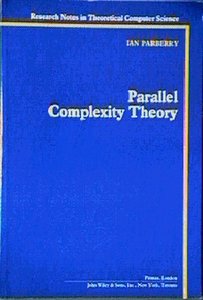
|
FreeComputerBooks.com
Links to Free Computer, Mathematics, Technical Books all over the World
|
|
- Title Parallel Complexity Theory
- Author(s) Ian Parberry, Sanjeev Arora and Boaz Barak
- Publisher: Princeton University (2007)
- Paperback N/A
- eBook PDF (489 pages)
- Language: English
- ISBN-10: 0470209313
- ISBN-13: 978-0470209318
- Share This:

|
This book is devoted to the investigation of a special topic in theoretical computer science - Parallel Computing and Programming as an abstract measure of the complexity of parallel computing problems.
Its main aim is to show how the theoretical study of parallel computing complexity can be useful in the process of designing effective parallel algorithms. The author shows how to get important information about the parallel complexity (parallel time, the number of processors, the descriptional complexity of the topology of the parallel architecture) of specific computing problems from knowledge of their parallel computing complexity. The book is written as a textbook for undergraduate and graduate students and provides a careful explanation of the subject as well as motivation for further research.
About the Authors-
N/A
- Parallel Computing and Programming
- Computational Complexity
- Algorithms and Data Structures
- Computational and Algorithmic Mathematics
 Similar Books:
Similar Books:
-
 Parallel Algorithms (Henri Casanova, et al)
Parallel Algorithms (Henri Casanova, et al)
Focusing on algorithms for distributed-memory parallel architectures, the book extracts fundamental ideas and algorithmic principles from the mass of parallel algorithm expertise and practical implementations developed over the last few decades.
-
 Is Parallel Programming Hard? If So, What Can You Do About It?
Is Parallel Programming Hard? If So, What Can You Do About It?
It examines what makes parallel programming hard, and describes design techniques that can help you avoid many parallel-programming pitfalls. It is primarily intended for low-level C/C++ code, but offers valuable lessons for other environments as well.
-
 Data Parallel C++: Mastering DPC++ Programming
Data Parallel C++: Mastering DPC++ Programming
Learn how to accelerate C++ programs using Data Parallelism. This book enables C++ programmers to be at the forefront of this exciting and important new development that is helping to push computing to new levels.
-
 Pro TBB: C++ Parallel Programming with Threading Building Blocks
Pro TBB: C++ Parallel Programming with Threading Building Blocks
This book is a modern guide for all C++ programmers to learn Threading Building Blocks (TBB). It presents numerous examples and best practices to help you become an effective TBB programmer and leverage the power of parallel systems.
-
 Introduction to Parallel Computing (Blaise Barney)
Introduction to Parallel Computing (Blaise Barney)
This book explains how to design, debug, and evaluate the performance of distributed and shared-memory programs. It teaches students how to compile, run and modify example programs. It is a complete end-to-end source of information on almost all aspects.
-
 Parallel Programming in MPI and OpenMP (Victor Eijkhout)
Parallel Programming in MPI and OpenMP (Victor Eijkhout)
This is a textbook about parallel programming of scientific application on large computers, learn how to design, analyze, implement, and benchmark parallel programs in C/C++ and Fortran using Message Passing Interface (MPI) and/or OpenMP.
-
 Parallel Scientific Computing in C++ and MPI: Algorithms
Parallel Scientific Computing in C++ and MPI: Algorithms
This book provides a seamless approach to numerical algorithms, modern programming techniques and parallel computing, includes both basic and advanced topics and places equal emphasis on the discretization of partial differential equations and on solvers.
-
 The Practice of Parallel Programming (Sergey A. Babkin)
The Practice of Parallel Programming (Sergey A. Babkin)
This book provides an advanced guide to the issues of the parallel and multithreaded programming. It goes beyond the high-level design of the applications, into the details that are often overlooked but vital to make the programs work.
-
 Notes on Theory of Distributed Systems (James Aspnes)
Notes on Theory of Distributed Systems (James Aspnes)
This book rovides a comprehensive source of material on the principles and practice of distributed computer systems and the exciting new developments based on them, using a wealth of modern case studies to illustrate their design and development.
-
 Distributed Systems, 3rd Edition (Maarten van Steen, et al)
Distributed Systems, 3rd Edition (Maarten van Steen, et al)
This book covers the principles, advanced concepts, and technologies of distributed systems in detail, including: communication, replication, fault tolerance, and security. It shows how distributed systems are designed and implemented in real systems.
-
 Introduction to High-Performance Scientific Computing (Eijkhout)
Introduction to High-Performance Scientific Computing (Eijkhout)
This is a textbook that teaches the bridging topics between numerical analysis, parallel computing, code performance, large scale applications. it assumes a basic knowledge of numerical computation and proficiency in Fortran or C programming.
-
 O'Reilly® Parallel and Concurrent Programming in Haskell
O'Reilly® Parallel and Concurrent Programming in Haskell
This hands-on book shows you how to use the language’s many APIs and frameworks for writing both parallel and concurrent programs. You'll learn how parallelism exploits multicore processors to speed up computation-heavy programs.
-
 Parallel Programming in Fortran 95 using OpenMP
Parallel Programming in Fortran 95 using OpenMP
Nowadays parallel computers are very common in research facilities as well as companies all over the world and are extensively used for complex computations, like simulations of atomic explosions, folding of proteins or turbulent flows.





